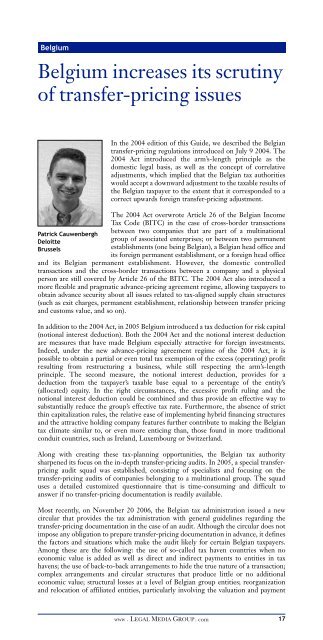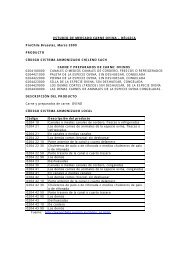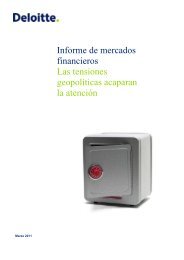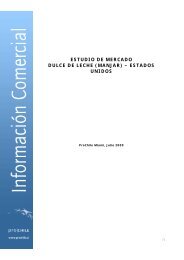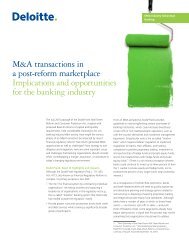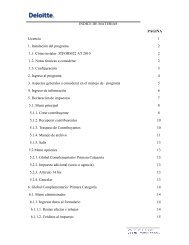Tax Advisers - Deloitte
Tax Advisers - Deloitte
Tax Advisers - Deloitte
Create successful ePaper yourself
Turn your PDF publications into a flip-book with our unique Google optimized e-Paper software.
Belgium<br />
Belgium increases its scrutiny<br />
of transfer-pricing issues<br />
Patrick Cauwenbergh<br />
<strong>Deloitte</strong><br />
Brussels<br />
In the 2004 edition of this Guide, we described the Belgian<br />
transfer-pricing regulations introduced on July 9 2004. The<br />
2004 Act introduced the arm’s-length principle as the<br />
domestic legal basis, as well as the concept of correlative<br />
adjustments, which implied that the Belgian tax authorities<br />
would accept a downward adjustment to the taxable results of<br />
the Belgian taxpayer to the extent that it corresponded to a<br />
correct upwards foreign transfer-pricing adjustment.<br />
The 2004 Act overwrote Article 26 of the Belgian Income<br />
<strong>Tax</strong> Code (BITC) in the case of cross-border transactions<br />
between two companies that are part of a multinational<br />
group of associated enterprises; or between two permanent<br />
establishments (one being Belgian), a Belgian head office and<br />
its foreign permanent establishment, or a foreign head office<br />
and its Belgian permanent establishment. However, the domestic controlled<br />
transactions and the cross-border transactions between a company and a physical<br />
person are still covered by Article 26 of the BITC. The 2004 Act also introduced a<br />
more flexible and pragmatic advance-pricing agreement regime, allowing taxpayers to<br />
obtain advance security about all issues related to tax-aligned supply chain structures<br />
(such as exit charges, permanent establishment, relationship between transfer pricing<br />
and customs value, and so on).<br />
In addition to the 2004 Act, in 2005 Belgium introduced a tax deduction for risk capital<br />
(notional interest deduction). Both the 2004 Act and the notional interest deduction<br />
are measures that have made Belgium especially attractive for foreign investments.<br />
Indeed, under the new advance-pricing agreement regime of the 2004 Act, it is<br />
possible to obtain a partial or even total tax exemption of the excess (operating) profit<br />
resulting from restructuring a business, while still respecting the arm’s-length<br />
principle. The second measure, the notional interest deduction, provides for a<br />
deduction from the taxpayer’s taxable base equal to a percentage of the entity’s<br />
(allocated) equity. In the right circumstances, the excessive profit ruling and the<br />
notional interest deduction could be combined and thus provide an effective way to<br />
substantially reduce the group’s effective tax rate. Furthermore, the absence of strict<br />
thin capitalization rules, the relative ease of implementing hybrid financing structures<br />
and the attractive holding company features further contribute to making the Belgian<br />
tax climate similar to, or even more enticing than, those found in more traditional<br />
conduit countries, such as Ireland, Luxembourg or Switzerland.<br />
Along with creating these tax-planning opportunities, the Belgian tax authority<br />
sharpened its focus on the in-depth transfer-pricing audits. In 2005, a special transferpricing<br />
audit squad was established, consisting of specialists and focusing on the<br />
transfer-pricing audits of companies belonging to a multinational group. The squad<br />
uses a detailed customized questionnaire that is time-consuming and difficult to<br />
answer if no transfer-pricing documentation is readily available.<br />
Most recently, on November 20 2006, the Belgian tax administration issued a new<br />
circular that provides the tax administration with general guidelines regarding the<br />
transfer-pricing documentation in the case of an audit. Although the circular does not<br />
impose any obligation to prepare transfer-pricing documentation in advance, it defines<br />
the factors and situations which make the audit likely for certain Belgian taxpayers.<br />
Among these are the following: the use of so-called tax haven countries when no<br />
economic value is added as well as direct and indirect payments to entities in tax<br />
havens; the use of back-to-back arrangements to hide the true nature of a transaction;<br />
complex arrangements and circular structures that produce little or no additional<br />
economic value; structural losses at a level of Belgian group entities; reorganization<br />
and relocation of affiliated entities, particularly involving the valuation and payment<br />
17


